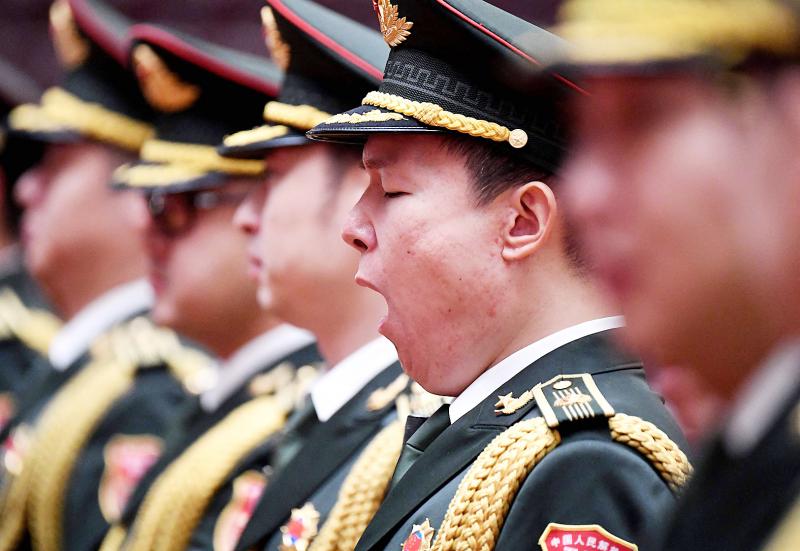Chinese state media have sought to quiet online speculation that a conflict with Taiwan might be imminent, in a sign of how heated rhetoric between Washington and Beijing was feeding public concern about the risk of war.
Chinese social media networks have seen a flurry of chatter about a possible Taiwan crisis in the past few days, seemingly fueled by Beijing’s call for citizens to stockpile food and an unrelated message claiming to show the nation was preparing to mobilize military reserves.
The surge came after a report by China’s state broadcaster saying that Taiwanese were hoarding their own survival supplies.

Photo: AFP
On Tuesday, the Economic Daily published a commentary urging the public “not to over-read” a Chinese Ministry of Commerce statement encouraging families to stock up on some daily necessities due to supply-chain concerns.
Then, late on Tuesday, a social media account affiliated with the official People’s Liberation Army Daily newspaper denounced the mobilization rumors as a “vile” and “malicious fabrication.”
“It will not only cause negative impact to the state, the military and society, it could also lead to severe consequences,” said the account, Junzhengping.
One screenshot of a text message widely circulated on social media urged reserves to “get ready for being recalled at any time” because “the Taiwan issue was very grim.”
Yesterday morning, the Junzhengping denial was among the top-trending topics on the Weibo social media network.
Still, the war talk continued to simmer, with a 63-year-old video of Chinese People’s Liberation Army generals singing that they “will definitely plant the flag of victory on Taiwan” getting more than 130 million views.
The controversy shows the challenge Chinese President Xi Jinping’s (習近平) government faces in trying to manage Chinese public sentiment over Taiwan, even with its vast censorship powers. Over months of saber-rattling over Taiwan, authorities have sometimes needed to step in to tone down the rhetoric and at other times faced backlash for perceived weakness.
The official China Daily newspaper warned in an editorial on Sunday that President Tsai Ing-wen (蔡英文) and her Democratic Progressive Party (DPP) were “leading Taiwan to an abyss.”
The paper cited a senior Chinese official’s pledge to spend the nation’s “post-unification” revenue on improving the well-being of its citizens as a remark that shows “confidence that the Taiwan question will be settled in the foreseeable future.”
Hu Xijin (胡錫進), the editor-in-chief of the Chinese Communist Party’s Global Times newspaper, offered a strategic rationale for the government’s rhetoric in a commentary published on Monday.
Hu said that “peaceful reunification” would likely result from applying enough pressure to make the DPP leadership believe it had no choice but to surrender.
“Personally, I believe there is still a chance for peaceful reunification, but it must be based on the condition that the DPP authority feels cornered and will perish if they do not accept reunification,” Hu said.

‘FORM OF PROTEST’: The German Institute Taipei said it was ‘shocked’ to see Nazi symbolism used in connection with political aims as it condemned the incident Sung Chien-liang (宋建樑), who led efforts to recall Democratic Progressive Party (DPP) Legislator Lee Kun-cheng (李坤城), was released on bail of NT$80,000 yesterday amid an outcry over a Nazi armband he wore to questioning the night before. Sung arrived at the New Taipei City District Prosecutors’ Office for questioning in a recall petition forgery case on Tuesday night wearing a red armband bearing a swastika, carrying a copy of Adolf Hitler’s Mein Kampf and giving a Nazi salute. Sung left the building at 1:15am without the armband and apparently covering the book with a coat. This is a serious international scandal and Chinese

PERSONAL DATA: The implicated KMT members allegedly compiled their petitions by copying names from party lists without the consent of the people concerned Judicial authorities searched six locations yesterday and questioned six people, including one elderly Chinese Nationalist Party (KMT) member and five KMT Youth League associates, about alleged signature forgery and fraud relating to their recall efforts against two Democratic Progressive Party (DPP) legislators. After launching a probe into alleged signature forgery and related fraud in the KMT’s recall effort, prosecutors received a number of complaints, including about one petition that had 1,748 signatures of voters whose family members said they had already passed away, and also voters who said they did not approve the use of their name, Taipei Deputy Chief Prosecutor

UNDER ATTACK: Raymond Greene said there were 412 billion malicious threats in the Asia-Pacific region in the first half of 2023, with 55 percent targeting Taiwan Taiwan not only faces military intimidation from China, but is also on the front line of global cybersecurity threats, and it is taking action to counter those attacks, President William Lai (賴清德) said yesterday. Speaking at the opening of this year’s Cybersec Expo in Taipei, the president assured foreign diplomats and exhibitors that Taiwan remained committed to strengthening its defense against cyberattacks and enhancing the resilience of its digital infrastructure. Lai referenced a report from the National Security Bureau (NSB) indicating that the Government Service Network faced an average of 2.4 million intrusion attempts daily last year, more than double the figure

Retired US general Robert B. Abrams reportedly served as adviser to Chief of the General Staff Admiral Mei Chia-shu (梅家樹) during the Ministry of National Defense’s computer-simulated war games in the buildup to this year’s 41st annual Han Kuang military exercises, local media reported yesterday. For 14 days and 13 nights starting on April 5 and ending yesterday, the armed forces conducted the computer-simulated war games component of the Han Kuang exercises, utilizing the joint theater-level simulation system (JTLS). Using the JTLS, the exercise simulated a continuous 24-hour confrontation based on scenarios such as “gray zone” incursions and the Chinese People’s Liberation